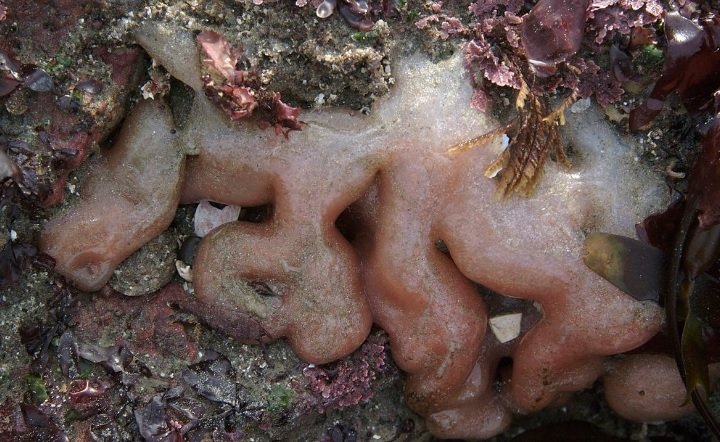Sea Pork

A photo of Sea Pork while still alive: A slimy mass on beach rocks that resembles fatty flesh. Photo: Atlas Obscura
On Thanksgiving weekend 2014, regional public information coordinator for the Florida Fish and Wildlife Conservation Commission, Karen Parker, found several blobs on the beach that resembled organs and blood. She began furiously messaging her colleagues to try and get an answer but ended up stumbling upon it herself at a nearby specimen aquarium. The blobs were sea pork.
What is Sea Pork?

This sea pork specimen somewhat resembles a lump chicken skin.
Sea pork is a term used to describe a group of water-dwelling creatures, such as Aplidium californicum, Aplidium solidum, and Aplidium stellatum, which have been around for hundreds of millions of years.
These creatures are invertebrates that filter and squirt water, and many of them are made up of colonies of tiny organisms called zooids, which huddle together in a gooey covering called a tunic.
This tunic is sort of like a squishy, strong armor made partly of cellulose. Sea pork can come in a range of colors, from pinkish-bologna to liver-purple to creamy-beige like roasted turkey. The name "sea pork" is said to come from the fact that when these creatures die, they sometimes look like shiny, fatty slabs.
For years, sea pork has been freaking out people at the beach, and for more than a century, scientists and others have been trying to set the record straight about it. It's not shocking that these critters give people the creeps: when they die, they can resemble gross, bloated chicken cutlets or soggy livers, making it pretty easy to imagine that some unlucky body parts are floating around in the ocean.
According to José H. Leal, the science director of the Bailey-Matthews National Shell Museum in Sanibel, seeing beached sea pork is pretty common in west Florida. While you can find various types of sea pork in Tanzania, Australia, the West Coast of the US and Canada, there are some reasons why the western edge of Florida is a particularly popular spot for these shiny blobs.
Is Sea Pork edible?
A video about sea pork found on Siesta Key Beach
While it probably won’t kill you, eating sea pork isn’t a great idea.
If you're thinking you've stumbled upon a free ocean-side meat market, think again - sea pork definitely won't taste like a juicy pork chop. Sea pork doesn't really have much of a scent either, just a slightly salty, ocean-like smell.
Some of sea pork's similar-looking relatives are considered a delicacy in South Korea and are called “meongge”. Unlike the dead ones that wash up on US shores, the ones people eat are farm-raised, stripped of their outer layer, and served up raw, fresh, and chewy.
Have you ever come across sea pork in the wild? Tell us about it in the comments!
If you enjoyed this article about sea pork you might be interested in the strange story of the Kentucky Meat Shower or the Oakville Blobs.






































